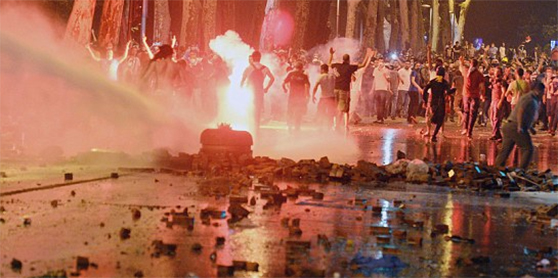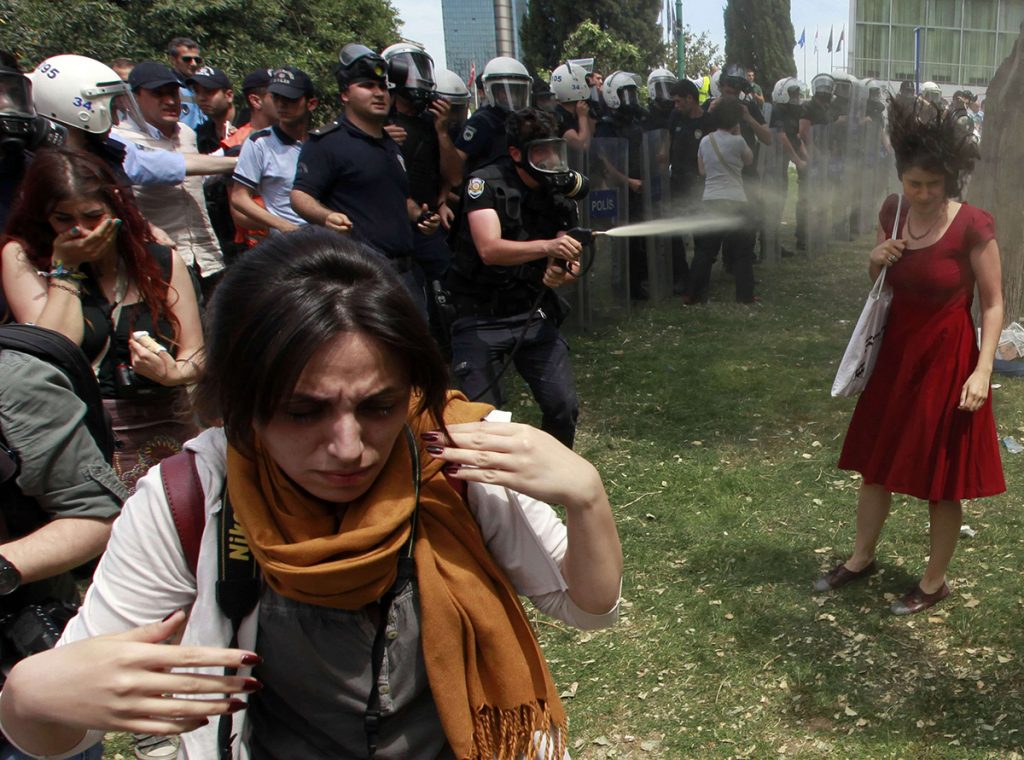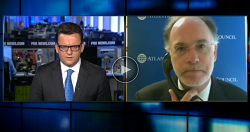
In soccer, an “own goal” is scored when a player accidentally hits the ball into his own net. The poor handling by Turkish authorities of demonstrations in Istanbul’s Taksim Square that spilled over to Ankara, Izmir and cities all over the country constitutes an own goal that now undermines the political prospects of Prime Minister Recep Tayyip Erdoğan and his ruling Justice and Development (AK) Party.
Members’ Conference CallOn June 5, Ambassador Ross Wilson and Dr. Sabine Freizer were featured in an Atlantic Council members’ conference call on the current protests in Turkey and what to expect next. Ross Wilson on Fox NewsOn June 3, Ambassador Wilson appeared on Fox News for an interview on Turkey’s protests |
Its uniting of the opposition seems more likely to be temporary than not. But the affair undoes the confident image of democratization, stability and sound management that Erdoğan and his colleagues have assiduously and fairly successfully cultivated during their decade in office.
What larger meaning Taksim may have for the country as a whole depends now on which Erdoğan–the truculent, somewhat authoritarian dominator or the crafty pragmatist who never likes to lose and has in the past generally been quick to cut his losses–predominates. It also depends on the Turkish street and the extent to which the AK Party government can effectively restore order and placate those now calling for its resignation. It won’t be easy.
The protests started innocuously enough. The Istanbul authorities have been carrying out a massive reconstruction project at Taksim Square, which sits in the heart of the older part of the city. The project involves among other things an underpass to relieve traffic congestion and the revamping of Gezi Park, one of the few green spaces in this particular part of the city.
The authorities approached this project typically–among themselves. They carried out little or no consultation or discussion with the broader citizenry, civic groups, or the media. They were vague about the park’s fate, talking variously about installing there a recreated historic Ottoman military barracks, a possible shopping mall in those barracks, or a mosque, adding to people’s aggravation about opaque arbitrary governance.
Taksim Square has long been a lightning rod for Turkey’s labor movement and leftist political parties that each year on May Day attempt to stage a big demonstration that either begins or ends in tough, often violent confrontation with the authorities. It should have been expected that the Taksim Square and Gezi Park project would attract a confrontation but seemingly was not.
From only a few dozen who gathered on May 29 as excavators allegedly planned to remove trees in the park, larger and larger numbers of Turks took to the area around Taksim Square in the following days. Some may have been the old-line and sometimes violent leftists. But the larger numbers of people who gathered over the weekend included many other Istanbul citizens with varied interests. Protests also metastasized all over the country, including in the capital Ankara, Izmir, and many other cities, and the violence is continuing. The scene is so tense that the US ambassador, who was anticipated in Washington for the June 3-5 annual meetings of the American Turkish Council, found it necessary to stay at his post.
The expanding protests have less to do with Gezi Park and are more about opposition to the rule of Erdoğan and the AK Party. Specific complaints are many.
- Many object to surprise legislation, rushed in a matter of hours last week through the Turkish parliament without the usual hearings and consultations, that curbed the hours during which alcohol could be sold and restricting the availability of liquor licenses at establishments near schools and mosques. For many Turks, this was yet another blow to secularism, representing action by AK Party Islamists to impose their lifestyle on others. Concerns were aggravated when Erdoğan, responding to critics of the measure, essentially called all who imbibe alcoholics.
- Another source of bitterness was Erdoğan’s naming of a new bridge across the Bosporus for an Ottoman sultan who, among other things, is associated with harsh rule and the persecution of Alevis, a branch of Islam that operates outside the Muslim mainstream in Turkey and has suffered for it. For Alevis, who constitute as much as twenty percent of the population, and others, it seemed an insulting step.
- Many Turks also object to the government’s policy on Syria and Erdoğan’s peace bid with the Kurdistan Workers’ Party (PKK) and its jailed leader, Abdullah Öcalan.
- Concerns are widespread about the muzzling of the media, creeping authoritarianism, and a possible AK Party-proposed constitution or constitutional amendment that would remake the country’s parliamentary system into a presidential one–led by Erdoğan, of course.
The initial protests could probably have been deflected by a deft police touch, but managing crowds of protesters is not a strong suit of the Turkish police. Its gross over-reaction and the images of tear-gassed citizens have added to the protests and seemed to portray a government out of control.
A Westerner who met with Erdoğan on May 31 has confidentially reported that the prime minister seemed both angry and very worried over the violence and its implications for Turkey and his government. No such anxieties were evident, however, in truculent remarks he made over the weekend that variously blamed the violence on social media, the opposition Republican People’s Party, and foreign-supported leftists. Erdoğan admitted no mistakes by the police or government and was contemptuous of the demonstrators.
Serious damage has been done to Erdoğan and the AP Party. At least momentarily, the mistakes by the government and police have united the opposition. This unity seems unlikely to last, but being on the defensive is exactly not where the AK Party wants to be as Turkey heads toward elections in 2014. The imprimatur that stability has given to the Turkish economy also took a beating. The Istanbul stock market plunged. Istanbul’s bid to host the 2020 Summer Olympics, another plank in AK Party plans for electoral victory, also looks tarnished.
An early end to Erdoğan’s rule and the country’s AK Party government seems unlikely. But what must have looked to Erdoğan like a rosy scenario of electoral victories in 2014, a presidential system that provides for his continued political leadership of the country, and further successes to come now looks open to question unless he can stop scoring points for his opponents, effectively restore order on city streets, and regain control of the debate which has been so characteristic of his governance. How he handles matters on the streets will also have implications for his Kurdish initiative. The task will not be easy, and the coming days will be crucial for Erdoğan’s and his government.
Ross Wilson is director of the Atlantic Council’s Eurasia Center and former ambassador to Turkey (2005-08) and to Azerbaijan (2000-03).
Photo credit: REUTERS/Osman Orsal
Image: turkey-protests-police-crackdown.jpg

